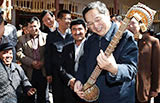Premier encourages innovation
By Zhao Yinan in Luoyang, Henan and Chen Jia in Beijing (China Daily) Updated: 2015-09-24 07:59
Nation's manufacturing sector continues to be hampered by rising labor costs and overcapacity
Premier Li Keqiang called for manufacturing companies to create a new driving force and stabilize China's economic growth through innovation.
Li made the comment on Wednesday in Henan province following the release of the Caixin China Manufacturing Purchasing Managers Index that showed further contraction in the manufacturing sector.
The preliminary reading dropped to a 78-month low of 47 in September from 47.3 in August.
A level of 50 separates expansion from contraction in the sector.
Mass innovation is not only for small and micro-sized companies but also for large companies, the premier said during a visit to a leading mining machinery manufacturer in Luoyang, Henan.
The company set up five workshops led by skilled workers with outstanding manufacturing expertise in 2013.
Zhang Dongliang, 50, is one of five worker leaders. His workshop solved 10 technical bottlenecks in 2014, and one of the 10 breakthroughs could save about 150,000 yuan ($23,500) every year for the company.
"There is always a discrepancy between design and hands-on production, and the mission of our workshop is to materialize the design as best as we can," Zhang said.
Li said the quality of made-in-China equipment sometimes still lags behind that of developed countries, partly because of the expertise of skilled workers.
"The workshop method is innovative, and I hope we use more high technologies in our production in the future, apart from the expertise," Li said.
The country's industrial sector has been contracting since 2014 because of overcapacity and the fast growth of labor costs. The multiyear low of the PMI may suggest that the economy will face strong headwinds before finding a new steady state.
The Chinese economy is still operating within the proper range, Chinese President Xi Jinping said in an interview published in The Wall Street Journal on Tuesday ahead of his state visit to the United States from Tuesday to Friday.
Although downward pressure on the economy may persist for a while, the Chinese government has plenty of policy room and options to achieve its annual growth targets, the country's top economic planner said in a statement on Tuesday.
Qu Hongbin, chief economist in China at HSBC Holdings, said that the PMI index's focus on the export-oriented sectors had been the biggest reason behind its decline in recent months.
"The implication for domestic demand is therefore less clear," he said. "Growth will therefore need to be more domestically driven."
Qu said that there have actually been some signs of cyclical recovery in the property market in the past few months. Meanwhile, both funding conditions and the project pipeline are improving for infrastructure investments.
"The combination of a cyclical recovery in the property market and acceleration of infrastructure investment should lay the groundwork for a modest rebound toward year-end," he added.
Economists expect further monetary and fiscal easing in the fourth quarter to maintain a fast pace of growth, including further cuts in the bank's reserve ratio and accelerated municipal bond issuances.
Xinhua contributed to this story.
Contact the writers at zhaoyi-nan@chinadaily.com.cn and chenjia1@chinadaily.com.cn
- Xinjiang gets a helping hand to improve locals' livelihoods
- Beijing to add bicycles, crack down on illegal parking
- Li: Blasts must bring harsh penalty
- Students' satellite launched into space
- Holidays spark shopping spree
- White paper on women's development
- China urges faster, cheaper Internet by year end
- Courts to avoid judgments in weak cases
- Scenic high-speed rail route opens in Jilin
- Upgraded combat drone is unveiled







